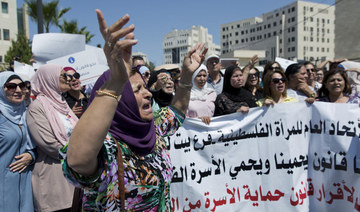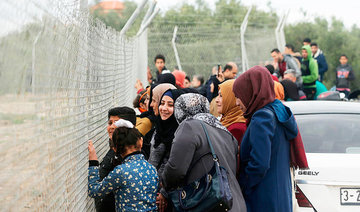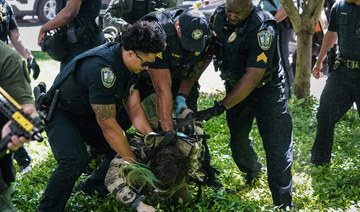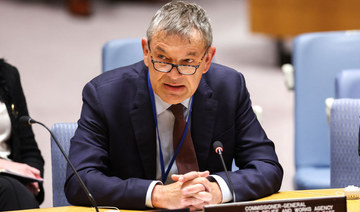HEBRON, Palestinian Territories: As the 30-ton truck weaves through the crowded Palestinian streets, groups of men stop and gawp at the diminutive figure of Dalia Al-Darawish in a purple headscarf seated behind the wheel.
Darawish is preparing for an exam to become one of only a handful of qualified female Palestinian truck drivers, a test the 26-year-old sees as about more than just driving.
“It is symbolic,” she said. “It shows we can do anything — that as a woman you can work, drive a trailer or whatever.”
The mother-of-two is among several Palestinian women pushing boundaries in the traditionally conservative city of Hebron in the Israeli-occupied West Bank, amid a growing assertiveness of women’s rights.
Darawish said she had faced criticism from both sexes as she trained, but the men were far more vocal.
“They are some who supported, a minority,” she said. “But then there are people shouting in the street, ‘No, why are you driving a trailer?!’”
“Whenever I made any mistake you would find men shouting, ‘It’s impossible (for you)’.”
At the driving center, she shakes slightly as her black-moustached examiner Issam Bedawi explains the test.
After briefly demonstrating her ability to detach and re-attach the trailer, the two clamber up into the carriage and drive off.
Recent months have seen protests in the West Bank after a 21-year-old woman was allegedly killed by her family members after posting a photo with her soon-to-be fiancé on Instagram.
The demonstrators are demanding more protection for women, but also a more prominent political movement for women’s rights.
Palestinian women still often give up their careers to care for children.
A World Bank study last year found that 58 percent of skilled women between 25 and 34 were unemployed, compared to 23 percent of men.
The general unemployment rate for women (44 percent) is double that of men, according to official Palestinian statistics.
Wafaa Al-Adhami had long dreamt of being an artist, but didn’t have the opportunity to study growing up.
But five years ago and with the kids older, she returned to her passion, studying hours of videos about artists on YouTube.
“Painting and art courses are expensive and I had no time,” she said. “So I loved educating myself.”
“Every artist has their own style, and I wanted to find mine,” she said.
From her living room table with an array of children passing through, she developed a specific layering technique for her work, pouring the paint onto the canvas before sculpting and manipulating it.
The result is a 3D texture that she says is unique among Palestinian artists.
Her inspiration ranges from Palestinian icons such as the Dome of the Rock mosque in Jerusalem to more Jackson Pollock-inspired surrealism.
A recent 40-work exhibition was a big hit.
Elsewhere in the city, 31-year-old Asia Amer has set up what she believes is Hebron’s first women-only restaurant.
The idea behind the Queen Restaurant, she said, is to give women a space to feel at home.
Those who normally wear the hijab can remove the headscarf if they wish.
“I felt that it was the right of women to have a place they can relax in — where there are no restrictions or people watching her,” she said.
“I am proof that Palestinian women don’t just stay at home to cook and look after the children.”
Back at the driving test center, Darawish pulls the trailer to a stop and waits nervously as Bedawi tallies up the score.
“I’m happy to say she passed,” he announces. “Everything I asked of her during the test she did fantastically.”
Darawish doesn’t even know if she will work as a truck driver, as right now she is still looking after her children.
But she said she wanted to help drive change in attitudes.
“(Society) has changed a little. There have been some developments, but not enough,” she said.
“If there had been big movement, men who see a woman driving a trailer would be happy or they wouldn’t say anything at all.”
‘Braking’ boundaries: Palestinian women seek new chances
‘Braking’ boundaries: Palestinian women seek new chances
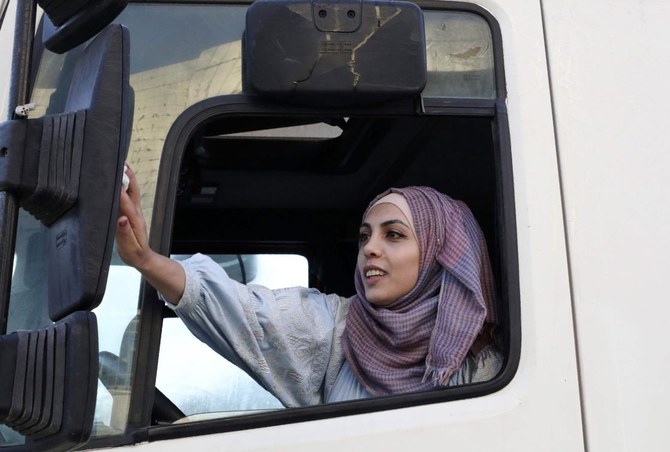
- Palestinian women are pushing boundaries in the traditionally conservative city of Hebron
- ‘(Society) has changed a little. There have been some developments, but not enough’
Lawyer for arrested Palestinian academic warns move could set ‘precedent’ for free speech in Israel
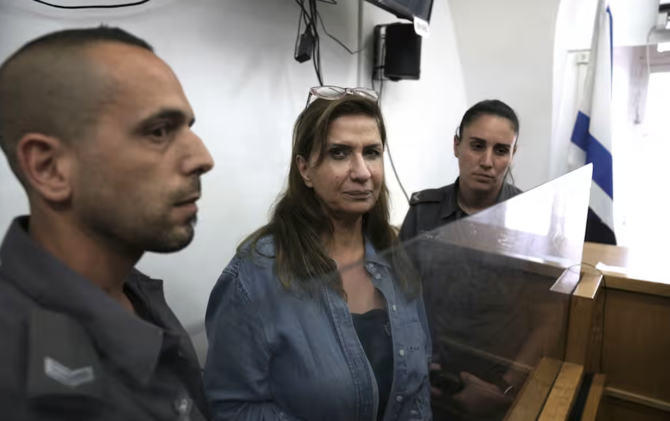
- Nadera Shalhoub-Kevorkian was detained for appearing on podcast to discuss state violence, genocide
- Hundreds of Palestinian citizens of Israel have been detained since Oct. 7 over criticism of Israel
LONDON: The lawyers for a Palestinian legal scholar arrested on April 17 have said her detention was “political” and could set a “precedent” for the treatment of academics and free speech in Israel.
Prof. Nadera Shalhoub-Kevorkian, a leading feminist academic with roles at the Hebrew University of Jerusalem and Queen Mary, University of London, was arrested after appearing on a podcast in March in which she discussed her work on state crimes, genocide, violence and surveillance in the context of the war in Gaza.
She was strip-searched by police, interrogated and denied access to food, water and medication for several hours, and held in a cold cell overnight before being bailed the next day. A number of her personal items, including posters and books, were also confiscated.
Hassan Jabareen, her lawyer and director of human rights organization Adalah, said: “This is not only about one professor, it could be a (precedent) for any academic who goes against the consensus in wartime.”
Israeli police claimed that she was being investigated on suspicion of incitement to terrorism, violence and racism, but a magistrate deemed she did not pose a threat after she was arrested, leading to her release.
Hundreds of Palestinian citizens of Israel have been arrested since the outbreak of hostilities after Oct. 7, with many detained for criticism of Israel.
All arrests in relation to freedom of speech issues must be signed off by Israel’s attorney general, and Shalhoub-Kevorkian has been ordered to return to face further questioning at the weekend.
Jabareen said: “They could have asked her to come to the police station for two or three hours to discuss, investigate.
“To carry out the arrest like that, as if she was a dangerous person, shows the main purpose was to humiliate her.
“It was illegal, that’s why the magistrates court accepted my argument that she should be released and the district court confirmed it.”
She added: “If they indict her, this might have a deeply chilling effect. It’s very difficult to prosecute a person for academic work … but the political situation in Israel is starting to not really be based on the rule of law.”
International academics have condemned Shalhoub-Kevorkian’s arrest and treatment, with over 100 colleagues from the Hebrew University of Jerusalem publishing a letter in support of her.
In addition, 250 academics at Queen Mary have signed a separate letter saying: “Academic freedom (in Israel) has come under sustained attack.”
In the Hebrew University academics’ letter, published by Israeli newspaper Haaretz, her colleagues said: “Regardless of the content of Nadera’s words, their interpretation and the opinions she expressed, it is clear to everyone that this is a political arrest, the whole purpose of which is to gag mouths and limit freedom of expression. Today it is Nadera who stands on the bench, and tomorrow it is each and every one of us.”
The Hebrew University also issued a short statement of support, despite the fact that in 2023 she was briefly suspended and asked to resign by the university’s rector after she called for a ceasefire in Gaza and suggested Israel could be guilty of genocide.
“We strongly object to many of the things that Prof. Shalhoub-Kevorkian said. Nonetheless, as a democratic country, there is no place to arrest a person for such remarks, however infuriating they may be,” it said.
Gaza baby rescued from dead mother’s womb dies

- Doctors were able to save the baby, delivering her by Caesarean section
- The baby suffered respiratory problems and a weak immune system, said Doctor Mohammad Salama who had been caring for Sabreen Al-Rouh
RAFAH, Gaza Strip: A baby girl who was delivered from her dying mother’s womb in a Gaza hospital following an Israeli airstrike has herself died after just a few days of life, the doctor who was caring for her said on Friday.
The baby had been named Sabreen Al-Rouh. The second name means “soul” in Arabic.
Her mother, Sabreen Al-Sakani (al-Sheikh), was seriously injured when the Israeli strike hit the family home in Rafah, the southernmost city in the besieged Gaza Strip, on Saturday night.
Her husband Shukri and their three-year-old daughter Malak were killed.
Sabreen Al-Rouh, who was 30-weeks pregnant, was rushed to the Emirati hospital in Rafah. She died of her wounds, but doctors were able to save the baby, delivering her by Caesarean section.
However, the baby suffered respiratory problems and a weak immune system, said Doctor Mohammad Salama, head of the emergency neo-natal unit at Emirati Hospital, who had been caring for Sabreen Al-Rouh.
She died on Thursday and her tiny body was buried in a sandy graveyard in Rafah.
“I and other doctors tried to save her, but she died. For me personally, it was a very difficult and painful day,” he told Reuters by phone.
“She was born while her respiratory system wasn’t mature, and her immune system was very weak and that is what led to her death. She joined her family as a martyr,” Salama said.
More than 34,000 Palestinians, many of them women and children, have been killed in the six-month-old war in Gaza between Israel and Hamas militants, according to the Gaza health ministry. Israel denies deliberately targeting civilians in its campaign to eradicate Hamas.
Much of Gaza has been laid to waste by Israeli bombardments and most of the enclave’s hospitals have been badly damaged, while those still operating are short of electricity, medicine sterilization equipment and other supplies.
“(Sabreen Al-Rouh’s) grandmother urged me and the doctors to take care of her because she would be someone that would keep the memory of her mother, father and sister alive, but it was God’s will that she died,” Salama said.
Her uncle, Rami Al-Sheikh Jouda, sat by her grave on Friday lamenting the loss of the infant and the others in the family.
He said he had visited the hospital every day to check on Sabreen Al-Rouh’s health. Doctors told him she had a respiratory problem but he did not think it was bad until he got a call from the hospital telling him the baby had died.
“Rouh is gone, my brother, his wife and daughter are gone, his brother-in-law and the house that used to bring us together are gone,” he told Reuters.
“We are left with no memories of my brother, his daughter, or his wife. Everything was gone, even their pictures, their mobile phones, we couldn’t find them,” the uncle said.
UN denounces ‘more serious’ Iran crackdown on women without veils

- Hundreds of businesses including restaurants and cafes have been shut down for not enforcing the hijab rule
- More women began refusing the veil in the wake of the 2022 death in custody of 22-year-old Mahsa Amini
GENEVA: The United Nations said Friday that it was concerned by reports of new efforts to track and punish Iranian women, some as young as 15, who refuse to wear the headscarf required under the country’s Islamic law.
The UN Human Rights Office also expressed alarm about a draft bill on “Supporting the Family by Promoting the Culture of Chastity and Hijab,” which would impose tougher sentences on women appearing in public without the hijab.
“What we have seen, what we’re hearing is, in the past months, that the authorities, whether they be plainclothes police or policemen in uniform, are increasingly enforcing the hijab bill,” Jeremy Laurence, a spokesman for the office, said at a press conference.
“There have been reports of widespread arrests and harassment of women and girls — many between the ages of 15 and 17,” he said.
Iranian police announced in mid-April reinforced checks on hijab use, saying the law was increasingly being flouted.
Hundreds of businesses including restaurants and cafes have been shut down for not enforcing the hijab rule, and surveillance cameras are being used to identify women without it, Laurence said.
More women began refusing the veil in the wake of the 2022 death in custody of 22-year-old Mahsa Amini after her arrest by Iran’s morality police for allegedly breaking the headscarf law, which sparked a wave of deadly protests against the government.
Laurence said that on April 21, “the Tehran head of the Islamic Revolutionary Guard Corps announced the creation of a new body to enforce existing mandatory hijab laws, adding that guard members have been trained to do so ‘in a more serious manner’ in public spaces.”
And while the latest draft of the new hijab bill has not been released, “an earlier version stipulates that those found guilty of violating the mandatory dress code could face up to 10 years’ imprisonment, flogging, and fines,” he said, adding that “this bill must be shelved.”
The Human Rights Office also called for the release of a rapper sentenced to death for supporting nationwide protests sparked by Amini’s death.
Toomaj Salehi, 33, was arrested in October 2022 for publicly backing the uprising.
“All individuals imprisoned for exercising their freedom of opinion and expression, including artistic expression, must be released,” Laurence said.
UN seeks to deescalate Sudan tensions amid reports of possible attack

- UN Secretary-General Antonio Guterres’ envoy is engaging with all parties to deescalate tensions
UNITED NATIONS: The United Nations is increasingly concerned about escalating tensions in Al-Fashir in Sudan’s North Dafur region amid reports that the Rapid Support Forces are encircling the city, signaling a possible imminent attack, the UN’s spokesperson said on Friday.
UN Secretary-General Antonio Guterres’ envoy is engaging with all parties to deescalate tensions in the area, the spokesperson said.
Israeli army says missile fire kills civilian near Lebanon

- The violence has fueled fears of all-out conflict between Iran-backed Hezbollah and Israel
- “Overnight, terrorists fired anti-tank missiles toward the area of Har Dov in northern Israel,” the Israeli army said
JERUSALEM: The Israeli army said Friday a civilian was killed near the country’s northern border with Lebanon, as near-daily exchanges of fire with Hezbollah rage.
Both sides have stepped up attacks this week, with Hezbollah increasing rocket fire and Israel saying it had carried out “offensive action” across southern Lebanon.
The violence has fueled fears of all-out conflict between Iran-backed Hezbollah and Israel, which last went to war in 2006.
“Overnight, terrorists fired anti-tank missiles toward the area of Har Dov in northern Israel,” the Israeli army said, referring to the disputed Shebaa Farms district.
“As a result, an Israeli civilian doing infrastructure work was injured and he was later pronounced dead.”
Israeli media reported that the victim was an Arab-Israeli truck driver. Police told AFP they had not identified the body, but said it was the only one found after a truck was hit.
Hezbollah said it had destroyed two Israeli vehicles in the Kfarshuba hills overnight in a “complex ambush” on a convoy using missiles and artillery.
The Israeli army did not comment directly on the claim.
It said Israeli fighter jets struck Hezbollah targets around Shebaa village in southern Lebanon including a weapons store and a launcher, while soldiers “fired to remove a threat in the area.”
It said fighter jets also “struck Hezbollah operational infrastructure in the area of Kfarshuba and a military compound in the area of Ain El Tineh in southern Lebanon.”
Lebanon’s official National News Agency reported that Shebaa village, Kfarshuba and Helta were targeted by “more than 150 Israeli shells,” leaving homes damaged.
Iran-backed Hezbollah has been trading almost-daily fire with the Israeli army since the day after its Palestinian ally Hamas carried out an unprecedented attack on Israel on October 7.
Since October 8 at least 380 people have been killed in Lebanon, including 252 Hezbollah fighters and dozens of civilians, according to an AFP tally.
Israel says 11 soldiers and nine civilians have been killed on its side of the border.
Tens of thousands of people have been displaced on both sides.



